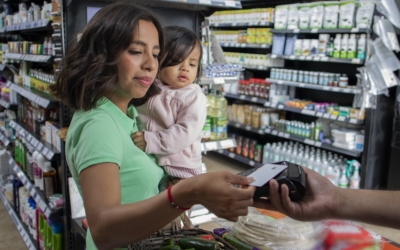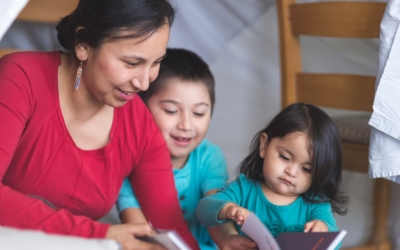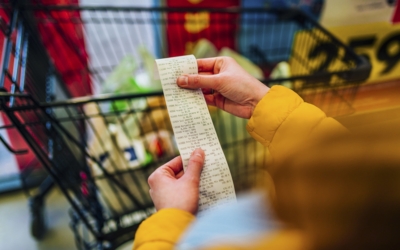Over the past several years, our research and evaluation activities have demonstrated how the I Can for Kids (iCAN) grocery gift card program offers food-insecure families a versatile and immediate means to help overcome life stressors. Due to the enhanced dignity and choice of our income-based approach, we’re occasionally asked whether there’s a risk that people could become dependent on our support. In this blog, we share how our recipients and agency partners collaborate with us to mitigate reliance on our services and maximize the number of families who benefit from our program.
The top priority is self-sufficiency
It’s essential to acknowledge that all food-insecure populations would prefer to achieve enough financial security that they could consistently meet all their basic needs on their own. The families we encounter aspire to become self-reliant as quickly as possible. For them, iCAN grocery gift cards represent an essential but temporary safeguard that secures better access to healthy food while they work with our agency partners to improve other life circumstances. We captured this sentiment in an interview with a new immigrant mother who explained: “My husband’s work permit has been delayed ever since we arrived, so he hasn’t been able to start a job and we’ve had to rely on our limited savings. The grocery gift cards make me feel like my family isn’t at as much risk for all sorts of problems. They provide so much freedom to navigate the rest of your life with less stress and more choice.”
The primary goal is financial stability
Research in Canada shows that less than 1 in 4 food-insecure households chooses to access food programs because this form of assistance provides no support to overcome their lack of income. While only the most desperate families seek assistance from food-based approaches, the goal of all food-insecure parents is to regain financial stability as quickly as possible. Evaluation of iCAN’s income-based response reveals how most families access our program rather briefly to ensure they can afford enough food for their kids during a period of financial crisis, such as unexpected job loss, sudden eviction from a rental home, and divorce. A young mother reached out to thank our donors during a rough patch caused by the current surge in rental costs: “Our family really needed grocery gift card support during the stress of our recent move. Now I can make sure our son has lunches when he starts at his new school.”
The focus is optimization of a finite resource
Parents invest considerable effort to use iCAN grocery gift cards sparingly and judiciously. Our recipients often interact with many other food-insecure families, and they quickly recognize how our program is a limited yet valuable resource for countless households who need to bridge income gaps during challenging times. Many families decline grocery gift cards when their financial situation stabilizes, such as this single mother who explained: “I don’t access support if I can afford to do it on my own, just so the other families have a chance too.” In addition, parents employ multiple strategies to optimize the purchasing power of each gift card, including price-matching, discounted products, and bulk orders. One family of four described how grateful they are for the freedom to choose cards for their local grocery store because “we know we can always find pink sticker items that are 50% off and we can stretch those gift cards even further.”
The advantage is the discernment of a targeted program
It’s important to note that I Can for Kids collaborates with diverse social service agencies who have the expertise to target our program to families in greatest need. Our partners interact with food-insecure households every day and they always explain how they continually assess which families are in greatest need of assistance at any given time. This flexible approach enables agency staff to distribute our grocery gift cards in an equitable manner while maintaining a strong understanding with their clients. Our most recent program evaluation sheds light on the dynamics of families who access our program:
- 25% of families access support once per month due to an ongoing financial crisis related to complex issues such as chronic unemployment, disability, physical injury, mental health struggles, or major health issues
- 50% of families seek assistance 3-6 times per year to bridge income gaps and maintain stable housing under the added pressure of the rising cost of living
- 25% of families require support one or two times during the year to cope with major financial shocks, such as moving costs, brief unemployment, or death of a family member
The benefit is the lasting impact of a temporary lifeline
The mission of our program is to empower children and families with dignified access to healthy food. Our agency partners and recipients describe iCAN grocery gift cards as a lifeline to guide families through periods of great distress caused by inadequate income, rising inflation, and unexpected emergencies. Vulnerable households simply want to gain the capacity to weather financial storms as they work with agency partners to regain control over a variety of social, economic, and life struggles. A grieving recipient just sent our donors a heartfelt note of appreciation: “I am a single father and have recently lost a child. This has left my family and I devastated. I have had to take a leave from work, so money isn’t great right now. Thanks to your donations, we can afford to get through this time much easier. Thank you.”
When you donate today, you enable our income-based approach to serve a crucial role in ensuring food-insecure kids and parents remain as healthy as possible while they navigate challenging times.
To join iCAN’s expanding list of donors, sponsors, and champions, check out the different ways you can get involved or donate.
To learn more about I Can for Kids and their unique approach to childhood food insecurity, visit www.icanforkids.ca
About Donald Barker
Donald Barker has worked as a registered dietitian for more than 25 years. He also has a professional background in communications and has long advocated for populations who face adverse, unjust, or systemic barriers that lead to higher rates of poor social, mental, emotional, and physical health outcomes. Donald currently volunteers as an Advisor with iCAN to support our transition towards evidence-based approaches that help improve the well-being of children in Calgary who live in low-income and food-insecure households.
About I Can for Kids Foundation
I Can for Kids works closely with multiple agency partners to target and distribute grocery gift cards to food-insecure families who are most in need. The iCAN grocery gift card program is a more dignified and inclusive approach to dealing with food insecurity, allowing families to shop where everyone else shops and to choose foods that are appropriate for their health and cultural needs. Explore their website to discover more about iCAN’s impact over the years.
For more information and media inquiries, please contact iCAN Executive Director, Bobbi Turko at bobbi@icanforkids.ca.




